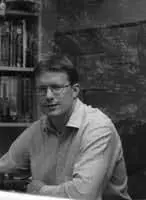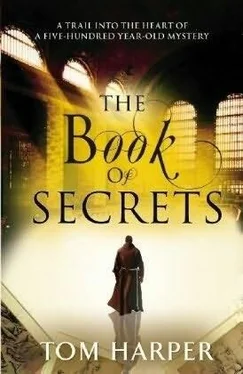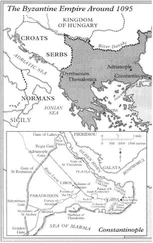‘I am going away,’ I said without preamble. There were murmurs of disappointment, but no great shock. Since the trial, and all that followed it, they had watched me slowly unravelling myself from the business of the house. After the great work of the Bible, I had no enthusiasm for calendars and grammar books.
‘Keffer will run the workshop in my absence. For the time being, he will focus on texts we already have set – indulgences and so forth – while we build up capital and train new apprentices.’
‘For the rest of you, you are welcome to stay in my house as long as you wish. But do not waste your time. Teach yourselves the arts you do not know. If you are a compositor, learn type-founding; if you have only ever boiled ink, learn how to spread it so that it makes an even impression every time. Share your knowledge freely. Then go back to your home towns, or cities you have always dreamed of, and establish workshops of your own. Train apprentices, and let them train apprentices of their own. Join no guild, but challenge each man to make his master-piece. Spread this art the length and breadth of Christendom so that all men may read, learn, understand and grow. You will make mistakes; only God is perfect. Some men, perhaps even some of you, will use this art we have devised for wrong ends. That is inevitable. This tool is too powerful to be kept in the hands of any one or two men. As long as we imprint more good on the world than would otherwise have been, this art will be a blessing.’
I left them there and went out into the warm April sunshine. I had given up my dream: I would not make any perfect thing. I was merely a man. At a younger age it would have devastated me; now I felt only the relief of a great burden lifted. I was at peace with an imperfect world.
I had not gone five miles from Mainz when I thought of a way I could make the press better.
For a man whose invention transformed the world, Johann Gutenberg left remarkably little of his own life imprinted on history: a few receipts, a couple of mentions in civic documents, and partial records of the four court cases referenced in this novel. Most of them raise more questions than they answer. The reality they reveal – industrial espionage, non-disclosure agreements, intellectual property rights, demand ing venture-capitalist investors, precarious financing, lawsuits – would be familiar to any Silicon Valley entrepreneur today. They remind us that printing was a uniquely complex and expensive undertaking, requiring vast sums of capital to be invested over many years, as well as management skills and a production-line organisation almost unknown in the Middle Ages. Gutenberg’s genius must have been for financial engineering and logistics, just as much as his technical mastery of inks, metals, mechanisms and paper. In this book, I have allowed my imagination free reign over Gutenberg’s early years. The later chapters, in Strassburg and Mainz, are more anchored to the few facts that are generally agreed.
But Gutenberg’s life is an open book compared to that of the Master of the Playing Cards. Nothing survives except for his work, a vague idea of the time and place where he lived, and the consensus that he was the first man to print images from copper engravings. Like other artistic breakthroughs, not least Gutenberg’s Bible, the cards are not just technologically innovative but genuine masterpieces.
The idea that these two giants of early printing could have met and collaborated is compelling, though unprovable. Both were active in the first half of the fifteenth century in the Rhineland; both used presses in some of the earliest examples of mechanised mass-production. As described in the novel, several of the Master’s images appear in an illuminated Gutenberg Bible now at Princeton University, while others appear in a giant handwritten Bible which must have been produced in Mainz at the same time as Gutenberg’s Bible was coming off the press.
If the ideal of the medieval artist was to leave no trace of himself on work that ultimately derived from God, then both Gutenberg and the Master of the Playing Cards succeeded almost too well. The Master’s name is lost to history; Gutenberg was equally forgotten for almost two hundred years, buried by Fust and Schoeffer’s propaganda. But for their passion to mass-produce text and images, the modern world is their monument.
I’d like to thank everybody who helped and encouraged me in writing this book. Dr Natalia Nowakowska of Somerville College, Oxford for sharing her research on early printing; Maxime Préaud at the Bibliothèque Nationale in Paris, who generously allowed me to examine the original playing cards; Dr Allen and the Mystery Writers’ Forum; Oliver Johnson, collaborator and editor; the Banse family and Isabella Paul for their hospitality in Germany and much else; my family, especially my father for his German expertise; Jon, Sarah and Agnes Hawkins, for whom The Rhineland Testament remains one of the great fictive might-have-beens; my agent Jane Conway-Gordon, despite her threats to withhold chocolate cake; the Inter-Continental Literary Agency; John Kelly; Charlotte Haycock and everyone at Random House; the staffs at the British Library in London and Boston Spa, the York Minster Library, and the JB Morrell library at the University of York.
After eight books, it would be easy to take my wife Emma’s patience and support for granted: instead, it only seems more extraordinary. She made what could have been a particularly challenging writing period one of the calmest I can remember.
My son Owen arrived a month after I began this book. He came along on my research trip, charmed his way across Europe, and was exposed to more Gothic architecture than is safe for any five-month-old. He also contributed random punctuation in the moments when he got through my defences to the keyboard. Born into a world where the communications revolution begun by Gutenberg is reaching unfathomable new dimensions, this book is for him.

Tom Harper was born in Germany and studied medieval history at Oxford university. He has written eight novels, including Knights of the Cross and Lost Temple. He lives in York with his wife and son.
***















